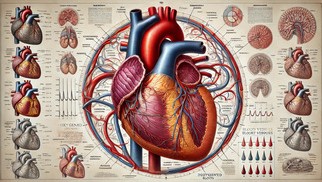Answering Popular Questions About Arterial Hypertension (High Blood Pressure)


Arterial hypertension, commonly known as high blood pressure, is a medical condition characterized by the persistent elevation of blood pressure levels in the arteries. It’s one of the most prevalent cardiovascular disorders, affecting millions worldwide. Left untreated, it can lead to severe health complications, including heart disease, stroke, and kidney damage. This article delves into some fundamental questions surrounding arterial hypertension, shedding light on its implications, management, and treatment options, including the use of medications like Demadex.
Is Arterial Hypertension the Same as High Blood Pressure?
Yes, arterial hypertension and high blood pressure refer to the same condition. The term "arterial hypertension" emphasizes the involvement of arteries, which are the blood vessels responsible for carrying oxygen-rich blood from the heart to the rest of the body. When the force exerted by the blood against the walls of the arteries remains consistently high, it is classified as hypertension.
Blood pressure is measured using two numbers: systolic (the top number) and diastolic (the bottom number). The systolic pressure represents the force exerted on the arterial walls when the heart beats, while the diastolic pressure measures the force during the heart’s rest between beats. A blood pressure reading of 120/80 mmHg is considered normal, while readings consistently above 130/80 mmHg are categorized as hypertension.
How Does Arterial Pressure Affect Blood Pressure?
Arterial pressure directly influences blood pressure. Arterial pressure refers to the force exerted by blood as it flows through the arteries. When arterial pressure is high, it places extra strain on the heart and blood vessels. This can occur due to several factors, including the narrowing of arteries (atherosclerosis), increased blood volume, or excessive arterial stiffness.
The relationship between arterial pressure and blood pressure is interdependent. If the arteries lose their elasticity or become obstructed, the heart must pump harder to maintain adequate blood flow, leading to elevated blood pressure. Conversely, persistently high blood pressure can damage the arterial walls, creating a vicious cycle that exacerbates hypertension.
Is 140/80 Blood Pressure Good or Bad?
A blood pressure reading of 140/80 mmHg is considered elevated and falls within the category of stage 1 hypertension. While the diastolic pressure (80 mmHg) is within the normal range, the systolic pressure (140 mmHg) is higher than recommended.
This level of blood pressure is not immediately dangerous but requires attention. Individuals with a reading of 140/80 are at an increased risk of developing cardiovascular diseases, such as heart attacks and strokes, if the condition persists. Lifestyle changes, including a healthy diet, regular exercise, and stress management, are crucial for controlling blood pressure. In some cases, medication may be prescribed to lower systolic pressure and reduce associated risks.
What Happens When Arterial Pressure Is High?
When arterial pressure is high, it puts excessive strain on the cardiovascular system, leading to several potential complications:
- Heart Strain: The heart works harder to pump blood against the increased resistance in the arteries. Over time, this can lead to left ventricular hypertrophy (enlargement of the heart’s left ventricle) and increase the risk of heart failure.
- Artery Damage: Persistently high arterial pressure can damage the delicate inner lining of the arteries, making them more susceptible to atherosclerosis. This can result in narrowed or blocked arteries, reducing blood flow to vital organs.
- Organ Damage: Organs like the brain, kidneys, and eyes are particularly vulnerable to high blood pressure. It can cause kidney failure, vision loss, and increase the risk of stroke.
- Aneurysms: High pressure can weaken arterial walls, leading to the formation of aneurysms, which are bulging areas that may rupture and cause life-threatening bleeding.
Effective management of arterial pressure is essential to prevent these complications and maintain overall cardiovascular health.
High Blood Pressure Causes
The causes of high blood pressure are multifaceted, ranging from lifestyle factors to underlying medical conditions. In many cases, the exact cause is unknown, a condition referred to as primary or essential hypertension. However, several risk factors are known to contribute to its development:
- Unhealthy Diet: Diets high in sodium and low in potassium can lead to an imbalance that raises blood pressure. Excessive consumption of processed foods, which often contain hidden salts, is a significant contributor.
- Physical Inactivity: A sedentary lifestyle can weaken the heart and blood vessels over time, making it harder for the body to regulate blood pressure effectively.
- Obesity: Carrying excess weight increases the strain on the heart and arteries, leading to higher blood pressure levels.
- Chronic Stress: Persistent stress can cause temporary spikes in blood pressure, and long-term stress may contribute to sustained hypertension by promoting unhealthy coping mechanisms like overeating or smoking.
- Medical Conditions: Secondary hypertension is caused by underlying health issues such as kidney disease, hormonal disorders (like hyperthyroidism), or sleep apnea. These conditions often exacerbate blood pressure regulation.
- Genetic Factors: A family history of hypertension increases the likelihood of developing the condition, suggesting a genetic predisposition.
- Substance Use: Excessive alcohol consumption and tobacco use damage the cardiovascular system, contributing to high blood pressure.
Understanding these causes is crucial for effective prevention and management. Addressing lifestyle factors through a balanced diet, regular exercise, stress reduction, and avoiding harmful substances can significantly reduce the risk of hypertension. In cases where medical conditions are a factor, treating the underlying cause is essential for controlling blood pressure and preventing complications.
Treatment with Demadex
Demadex (torsemide) is a loop diuretic commonly prescribed for the treatment of high blood pressure and fluid retention (edema) associated with conditions like heart failure, kidney disease, and liver cirrhosis. By promoting the removal of excess salt and water from the body, Demadex helps reduce blood volume, thereby lowering blood pressure and easing the workload on the heart.
How Demadex Works
Demadex acts on the kidneys, specifically targeting the loop of Henle, a structure involved in regulating salt and water balance. By inhibiting the reabsorption of sodium and chloride in this area, Demadex increases urine production and reduces fluid buildup in the body. This mechanism helps lower arterial pressure and control blood pressure levels effectively.
Benefits of Demadex for Hypertension
- Rapid Onset of Action: Demadex begins working within an hour of administration, providing quick relief from fluid overload and reducing blood pressure.
- Prolonged Duration: Compared to some other diuretics, Demadex has a longer duration of action, making it a convenient option for many patients.
- Effective Blood Pressure Control: By decreasing blood volume, Demadex helps lower both systolic and diastolic blood pressure, reducing the risk of hypertension-related complications.
Considerations and Side Effects
While Demadex is effective, it’s essential to use it under medical supervision. Common side effects include increased urination, electrolyte imbalances (low potassium or magnesium levels), and dehydration. Patients should be monitored for symptoms like dizziness, fatigue, or muscle cramps, which may indicate an imbalance.
Demadex is often used in combination with other antihypertensive medications to achieve optimal blood pressure control. Patients should follow their healthcare provider’s instructions regarding dosage and lifestyle modifications to enhance treatment outcomes.
Conclusion
Arterial hypertension, or high blood pressure, is a significant health concern that requires careful management to prevent long-term complications. Understanding the interplay between arterial pressure and blood pressure is crucial for effective treatment. A blood pressure reading of 140/80 mmHg, while not immediately alarming, warrants attention to prevent progression to more severe stages of hypertension.
Medications like Demadex play a vital role in managing high blood pressure, particularly when fluid retention is a contributing factor. By reducing blood volume and lowering arterial pressure, Demadex helps improve cardiovascular health and minimize risks associated with hypertension. However, successful management also requires lifestyle changes, regular monitoring, and adherence to prescribed treatments.
If you suspect you have high blood pressure or have been diagnosed with arterial hypertension, consult your healthcare provider for personalized advice and a comprehensive treatment plan. Early intervention is key to maintaining long-term health and preventing complications.
Article post: Editorial Team of RXShop.md
(Updated at Jan 12 / 2025)

